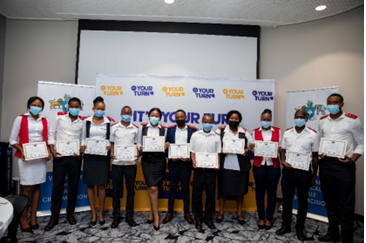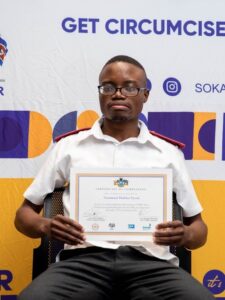
“My man is circumcised. Encourage yours too.” That’s just one of the phrases plastered on vans and billboards around the small Southern African country of Eswatini urging women to talk to their partners about getting circumcised. Printed alongside photos of young women with their partners or friends, the imperative is part of a Ministry of Health promotional campaign, led by Jhpiego, to increase demand for and expand access to voluntary medical male circumcision, or VMMC. This one-time procedure reduces the risk of female-to-male HIV transmission by 60 percent.
The Strengthening of the Kingdom of Eswatini’s Voluntary Medical Male Circumcision under PEPFAR project (VMMC Project) is funded by the U.S. Centers for Disease Control and Prevention (CDC) under the U.S. President’s Emergency Plan for AIDS Relief (PEPFAR), and closely collaborates with the Ministry of Health and CDC-funded implementing partners, namely URC, Elizabeth Glaser Pediatric AIDS Foundation, Georgetown University, PSI and The Luke Commission. The VMMC Project works with the Ministry of Health to make sure communities, especially young men between the ages of 15 and 29 years old, know about VMMC and have easy access to a health facility if they opt to undergo the procedure.
Eswatini has a high HIV prevalence rate of 24.8 percent but has made significant progress in meeting their treatment and prevention targets. In 2018, the Ministry of Health announced the country had reached the 90-90-90 global HIV targets two years earlier than expected and were focusing on achieving 95-95-95 targets by 2030. To reach the new target, the ministry is working with their partners to deploy diverse tactics, including marketing campaigns that encourage women to participate in their male partner’s health and task-shifting opportunities that help nurses conduct male circumcisions. In addition to reducing men’s risk of HIV infection, VMMC also has indirect health benefits for women. Women whose partners have had the procedure face a lower risk of exposure to HIV and other sexually transmitted infections including the virus that causes cervical cancer.

Historically, Eswatini’s Ministry of Health only permitted doctors to conduct VMMC procedures. Unfortunately, there weren’t enough doctors available. This meant that as demand increased, so did the waiting lines. To lessen client wait time at health facilities, the VMMC Project worked with the Ministry of Health’s VMMC Coordination Unit to advocate for the health ministry and other government stakeholders to implement task-shifting, a solution that allows nurses to perform all tasks related to the VMMC procedure. The project convened monthly meetings with relevant government entities at the national and community levels, developed technical materials that summarized evidence for the safety of nurses conducting VMMC procedures, and shared plans around introduction, training and scale up.

On May 6, 2021, the Principal Secretary of the Ministry of Health granted approval for training and accrediting degree holder nurses to provide all tasks related to VMMC for HIV prevention.
The VMMC Project, in collaboration with the VMMC Coordination Unit, drafted a road map to operationalize the task shifting plans. Since then, the project has helped train 39 nurses from different facilities across all four regions in the country on the procedure and more than 16,500 clients have received VMMC.
Nurse Andile received her certification to be a VMMC nurse circumciser in February 2022. Now, she works in a male outpatient department where she sees anywhere from two to 40 VMMC clients in a single day.
Being part of the program felt like it was a chance for me to play my part in HIV prevention. I was among the first cohort of nurses to be trained.”
Nurse Andile.

When clients come to the facility for VMMC, Andile offers high-quality care, from the moment they enter the facility to the moment they leave.
“Before I was trained, clients would have to book the procedure and walk-ins were turned away when a doctor was not around or was committed elsewhere,” says Andile. “Now VMMC services are readily available, including for walk-in clients. It’s been quite a positive change.”
Nurse Thabiso also attended the VMMC training and graduated as a nurse circumciser in December 2022.
I use a client-friendly approach and I’m proactive to make sure clients receive all the information they need.”
Nurse Thabiso
Jhpiego continues to collaborate with other sectors and stakeholders in Eswatini and identify key health workers, like Andile and Thabiso, to help expand access to VMMC in the country and make sure that men, who want to, can get circumcised to protect themselves and their partners.
This article was reviewed by Zebedee Mwandi, MBChB MPH, Sr. Regional Technical Advisor
Mhlonipheni Dexter Masilela is the Demand Creation and Communications Liaison for the Jhpiego Eswatini office.
Katherine Seaton is a Communications Manager with Jhpiego in the United States.
Photos by Mhlonipheni Dexter Masilela.




